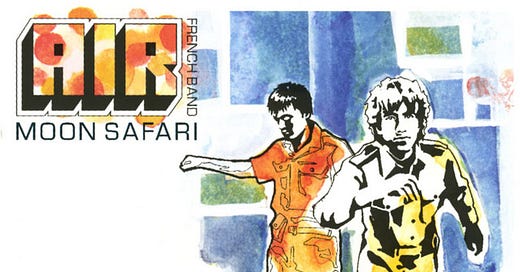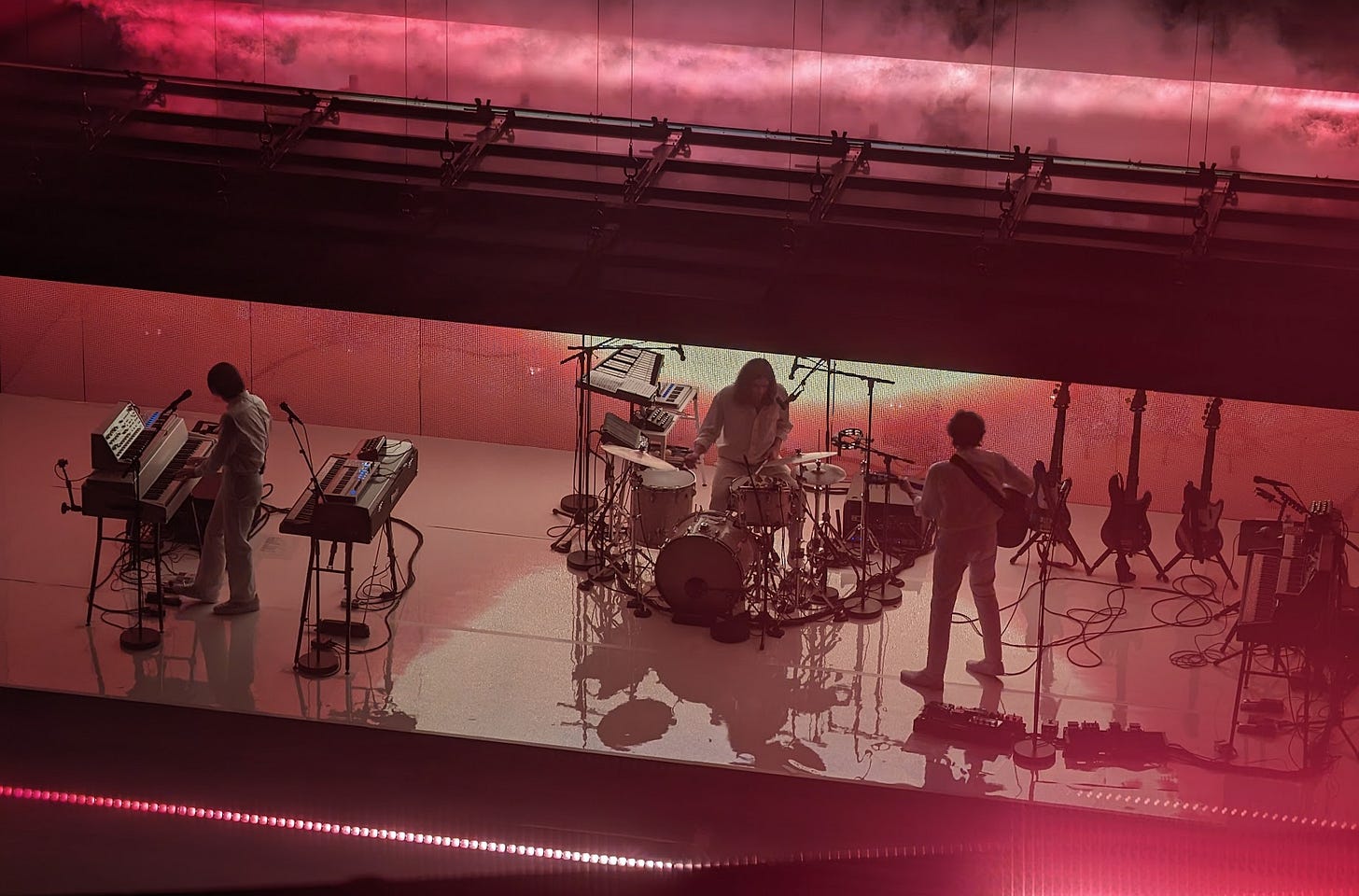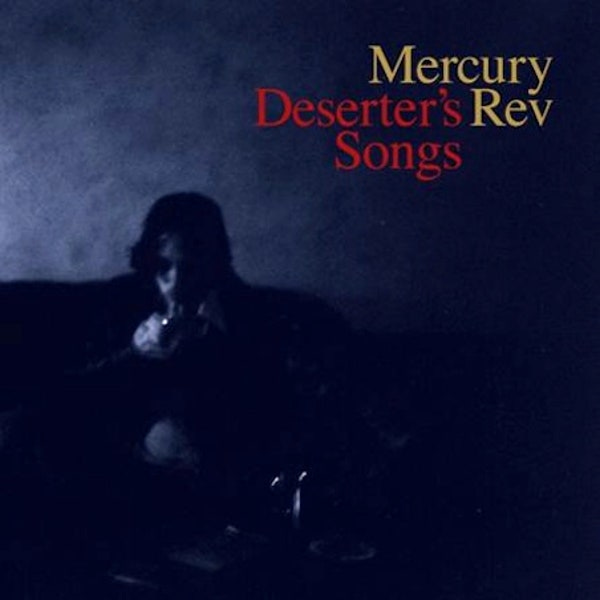Last Sunday, I was at The London Coliseum to make the slightly alarming progress from “Band Plays a Twenty-Year-Old Album in full” to “Band Plays a Twenty-Five-Year-Old Album in full”. The former list included The Flaming Lips (twice), Spiritualized, Mercury Rev, and The Super Furry Animals, and so far1, the quarter-of-a-century list contains one band: Air.
I’ve never been to a gig at the venue - and it immediately trumps some other London venues by not being a 25-minute walk from the nearest train station or well outside Zone 1, but it was also a perfect venue for a show! More please! Air’s performance turned out to be more than just a live rendition of their classic album, Moon Safari; it was a glorious fusion of auditory and visual performance that I’m sure took many of the audience back to post-club/gig/pub but pre-Sunday morning hours before the turn of the century. I overheard a man leaving behind me, probably in his early 30s, say that the show was like hearing his childhood return and rather than just having a story read to him - the authors were right there.
The French duo, still defying the years in pristine, white drainpipe pantaloon, laid down tracks that resonated with the same freshness as they did 25 years ago, yet with a twist that felt entirely of the moment. The stage setup, an ingenious blend of lighting and projections, created immersive landscapes that seemed to pull each note and lyric out of its original context and place it firmly in the present, crafting an experience that felt familiar and astonishingly new. It was like the band had been waiting for technology to catch up with the record's sound on tape and in their minds. As Dorian Lynskey claims in his five-star review, Air could be the house band for the interstellar salon in 2001: A Space Odyssey.
The band played a second set, with songs from the well-received but arguably not adored follow-ups 10 000 Hz Legend, Talkie Walkie, and the score to The Virgin Suicides. Those were thrilling differently, as those studio2 records have more driving motorik energy underpinning them. You can hear elements of Kraftwerk, Neu and Can on those records, which were on full display for the second set. Here’s the one thing about this gig that truly elevated it for me: they made Moon Safari sound like that, too.
The album’s closer, and therefore the closer of the show’s first half, is ‘Le Voyage de Pénélope’. This is not a song that I would hand to someone learning the drums as an example of the art of the possible. There is percussion on the track, but it is light, airy, and dreamy—befitting the mood of the rest of the record. Below is them performing the track in Paris earlier this month; you can feel the propulsion the drumming of Louis Delorme gives their stage presence, which Nicolas Godin and Jean-Benoît Dunckel wouldn’t be able to pull off on their own.
With the first side of the record containing a one-two-three hit of singles ‘Sexy Boy’, ‘All I Need’ and ‘Kelly Watch The Stars’, you could be forgiven that the rest of it trails away. It does nothing of the sort - maintaining the atmosphere of effortless Gallic chic and ending with this fan favourite. The joy of anyone (re)discovering the record in 2024 is that you can revel in the borrowed nostalgia for the 1970s3 it was aiming to evoke - all yacht rock, synthesisers and ELO, but also the actual nostalgia for the late 1990s it now represents - the amount of electronic music at the time that was moving into serious rock music lawn of landmark albums (The Chemical Brothers, Daft Punk, Moby and The Prodigy all had big records that drove conversation, garnered critical acclaim and sold CDs in Woolworths around this time).
This burgeoning field of downtempo and ambient pop also helped, along with its close post-night-out cousin, the Bristolian coffee table bothering genre of trip-hop, a raft of compilations like Café del Mar and Back To Mine fill their allotted 70 minutes. You also can’t avoid the artists that followed in their slipstream, Morcheeba, Zero 7, Royksopp, Goldfrapp on Felt Mountain and the proliferation of near countless downtempo remixes of bands like Radiohead, U2, Depeche Mode and others appearing on CD2 of the second single from the album.
One thing, whether on record or what I heard last week in London, is that the song’s melody is joyful and hopeful. It is an instrumental piece that encapsulates the album's dreamy, laid-back vibe, using synthesisers, a steady bassline, and light, rhythmic drum patterns (on record, at least) to create a soundscape that felt both nostalgic and futuristic, then and now.
I don’t know if the track's title is meant to evoke the imagery of the journey by the Homeric character Penelope, known for her patience and fidelity during Odysseus's prolonged absence, or it was a nod to the 1996 TV movie of the same name. The album captures the futuristic nature of global connections, albeit looking forward from the 1970s, in the same way as Radiohead’s OK Computer does, but more warmly and less clinically through a similar thoroughness and approach to sonic exploration through moods and textures.
Wherever Moon Safari took you, ‘Le Voyage de Pénélope’ is that period of rest bite in the airlock as we return. It functions as a decompression and a summary of the record, bringing us back to Earth and ending the album on an understated and satisfying note.
The Run Out Grooves Infinite Loops
Another classic from 1998.
Wavin' goodbye I'm not sayin' hello
In December 1998, Mercury Rev were placed at the top of the NME’s albums of the year, beating out Air, The Beastie Boys, Massive Attack and Beck. I was only 15 then and didn’t know much about any of those albums, but within 18 months, I’d started reading the magazine as well as
I will be on holiday for a week - so we will be back in mid-April with a record from 1980.
OK, this is technically not true—I saw Echo and The Bunnymen play Ocean Rain for the 25th anniversary in 2008, but I’m counting seeing albums I heard contemporaneously here, so I’m also excluding Pixies' 30th anniversary shows since 2017 for this point.
Obviously, The Virgin Suicides doesn’t sound like a Krautrock soundtrack; that would not work.
This is something it shares, in a very different way, with the Scarfolk-style liminal musings of Boards of Canada on Music Has the Right to Children, The EP In a Beautiful Place Out in the Country, and Geogaddi.






Nice read! Isn't it cool when you go to a show and expect that a band revisiting the past might not seem fresh, but then it does? I agree that there are two layers of nostalgia that Moon Safari has accrued now that 25 years have passed -- the nostalgia for the '90s era the album was released in, but also the nostalgia for the '70s the band were intentionally trying to evoke. I think that's one of the coolest things about revisiting Moon Safari now. Nice to hear you had a nice time!